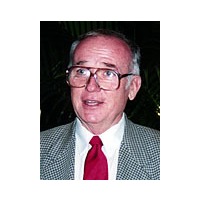In the Shadow of Basho
Renowned Business Professor & Japan Authority Robert E. Garrity
Robert E. Garrity, often referred to as “the Grand Poobah of Gaijin” began his forty-year love affair with Japan in the 1950s where he spent seven years living in various parts of the country. After a distinguished career with the United States Air Force he moved to Honolulu, Hawaii where he was employed as a Business Professor by the University of Hawaii and established the Japan-America Marketing Institute. Professor Garrity is regarded as an expert on International Business and is an avid student of the art of Haiku. He has lectured at numerous universities and has visited Japan some ninety times over the past fifteen years to conduct lectures, seminars and consulting assignments at various companies including IBM, Daiwa Securities, Mitsubishi, Tokyo Marine Insurance, Citibank, General Electric, EDS, and Fujitsu to name just a few.
|
 |
|
TJ: Tell us about your early years in Japan. Was it harder being a gaijin back then?
RG: In some respects, yes. For example, when I got married to my Japanese wife in 1961, everyone was against it – her parents, my parents, the United States government, the Japanese government – everyone! But we did it anyway and it’s one of the best decisions I’ve ever made.
TJ: You often lecture on American business practices here in Japan with many of your lectures focusing on entrepreneurism. Would you say you are an importer of ideas?
RG:I try to instill the entrepreneurial spirit in my Japanese students. It is true that the Japanese have a lot to learn about the American entrepreneurial spirit, but by no means is entrepreneurism a new idea in Japan. In fact, many of Japan’s most well known business proprietors were true entrepreneurs.
TJ: Can you give us an example?
RG:Yes, a good example would be Takatoshi Mitsui. The Mitsui name, similar to the Rothchilds of Europe and the Vanderbuilts of the United States, represents wealth and power in Japan. The Mitsui family dominated the banking, trading and mining industries for decades. Founder of Mitsukoshi Department Stores and Sakura Bank, Takatoshi Mitsui began his business empire in 1673 as a dealer of dry goods. In those days, dealers sold their goods with varying prices depending on if the customer was a feudal lord, a warrior, a merchant, etc. and they ran the high risk of collecting fees only twice a year. Mitsui was the first to use price tags on his goods and all customers paid the same price in cash regardless of their social status. This greatly reduced his business risks and allowed him to offer reasonable prices. He realized the need for giving customers what they wanted. For example, back in the 1600s, cloth was sold in standard size strips. Mitsui broke this trend by cutting his customers any sized-cloth they wanted and charging accordingly. What made Mitsui so special is that many of his practices are theories we are still trying to teach business professionals today.
TJ: That’s very interesting. Has this entrepreneurial spirit died off in Japan?
RG: Not entirely. You may have heard about “The New Economy” which refers to e-commerce and innovative Internet companies. In the old economy, there is an old Japanese expression that says “the nail that sticks up gets hammered down”. This refers to the Japanese collective society theory about how the Japanese work together as a group and this theory is what kept everyone in order. However, I have developed a new philosophy: “In the New Economy, the nail that sticks up owns the hammer”. Softbank is a nail that sticks up, and entrepreneur Masayoshi Son owns the hammer. I would say that if are you looking at the future up and coming companies of Japan, Softbank is one of them. They will invest in some 700 companies over the next couple of years, they’re bringing NASDAQ to Japan, they own about 28% of Yahoo.com and a number of other Internet companies. There is also NABA Corp., Digital Magic, and a number of other companies in DIT valley – which is the new emerging Silicon Valley of Tokyo just outside Shibuya.
TJ: It sure seems like you have your finger on the pulse of Japan. Where do you gain your motivation to stay on top of it all?
RG: I’ve spent a good portion of my life following the trends and educating others so that they can continue where I leave off. In order to accurately predict the future, first we must understand the past. I gain a great deal of my motivation through the study of Haiku – Japanese poetry. One individual who has greatly inspired me is Matsuo Basho, the founder of modern day Haiku. He walked across Japan and transcribed his thoughts in “Oku no Hosomichi” or “Journey to the Interior”. Now I walk in the Shadow of Basho reflecting on my life experiences. On each trip I make to Japan, I travel by train to the spot where I last left off. I walk from morning till sundown along the same trail that Basho followed keeping a journal of my experiences and encounters. This provides me with great inspiration and helps me to keep life balanced.
Did you know . . .
The total cost of sending a child to a private school in Tokyo from kindergarten through high school is ¥17.71 million?
(Source: Tokyo Metropolitan Government)
|










